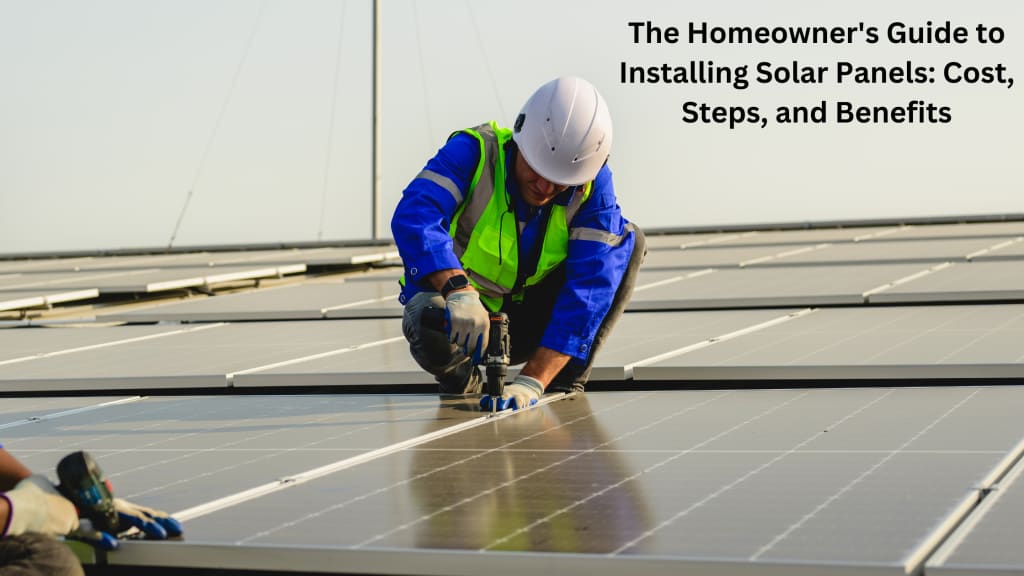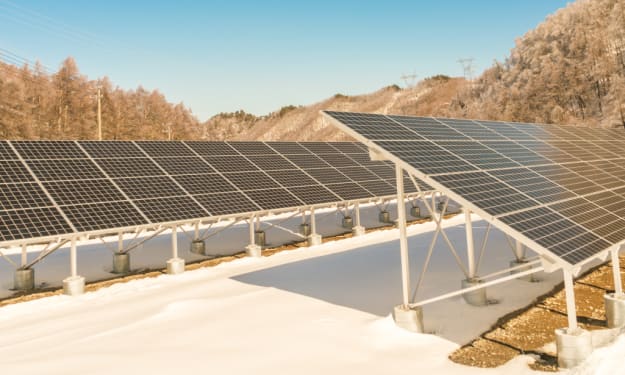The Homeowner's Guide to Installing Solar Panels: Cost, Steps, and Benefits
Discover the comprehensive homeowner's guide to installing solar panels, covering costs, step-by-step installation, and the myriad benefits. Learn about the initial investment, government incentives, and the eco-friendly impact of solar energy. Take control of your energy future while reducing costs and contributing to a sustainable planet.

As energy costs continue to rise and the push for sustainable living grows, more homeowners are turning to solar panels as a viable solution for powering their homes. This guide will walk you through the essential aspects of solar panel installation, including costs, the step-by-step process, and the numerous benefits of harnessing solar energy.
Understanding the Costs
Initial Investment
The initial cost of installing solar panels varies greatly depending on a number of factors, including the size of your property, your energy requirements, and the type of solar panels you select. A comprehensive solar panel system will cost homes between $10,000 and $30,000 on average.
Government Incentives and Rebates
To help offset these expenses, several governments provide incentives and rebates for solar panel installations. These can drastically cut total costs. It is critical to explore the various programs available in your region.
Long-term Savings
While the initial expenditures may appear hefty, solar panels may result in significant savings on your energy bills over time. Most systems pay for themselves in 7 to 10 years due to lower utility bills, and with a 25-30-year lifespan, the long-term financial benefits are significant.
Step-by-Step Solar Installation Process
1. Site Assessment
The first step is a site assessment to determine the suitability of your property for solar panels. Factors like roof orientation, shading, and available space are evaluated to ensure optimal performance.
2. System Design
Based on the assessment, a customized solar panel system is designed to meet your energy needs. This includes determining the number and type of panels, as well as the placement and angle for maximum efficiency.
3. Permits and Approvals
Before installation can begin, you'll need to obtain the necessary permits and approvals from local authorities. Solar Installation process can vary depending on your location but is crucial to ensure compliance with building codes and regulations.
4. Installation
Once permits are secured, the actual installation process begins. This typically involves mounting the panels on your roof, installing the inverter (which converts solar energy into usable electricity), and setting up the wiring.
5. Inspection and Activation
After installation, a final inspection is conducted to ensure everything is properly installed and functioning correctly. Once approved, your system can be activated, and you'll start generating your own solar power.
Benefits of Solar Panels
Switching to solar energy is not just an environmentally conscious decision; it's a smart financial and practical move for homeowners. Here are some key benefits of installing solar panels on your property:
1. Environmental Impact
Renewable Energy Source
Solar panels harness energy from the sun, a renewable resource that is abundant and sustainable. Unlike fossil fuels, solar power does not deplete natural resources or cause harmful emissions.
Reduced Carbon Footprint
By generating electricity from solar power, you significantly reduce your carbon footprint. Solar energy production is clean, emitting no greenhouse gases or pollutants, thereby contributing to cleaner air and a healthier environment.
2. Financial Savings
Lower Energy Bills
One of the most immediate benefits of solar panels is the reduction in energy bills. By generating your own electricity, you rely less on the grid, which means lower utility costs.
Return on Investment
Although the initial investment can be substantial, solar panels typically pay for themselves within 7 to 10 years through savings on energy bills. With a lifespan of 25-30 years, the long-term financial benefits are significant.
Government Incentives and Rebates
Many governments offer financial incentives, tax credits, and rebates to encourage the adoption of solar energy. These can significantly reduce the upfront costs of installation.
3. Energy Independence
Protection Against Rising Energy Costs
Generating your own electricity shields you from fluctuating energy prices. As utility rates continue to rise, having solar panels ensures you are less affected by these increases.
Grid Independence
Solar panels provide a degree of energy independence. In some cases, especially with battery storage, you can maintain power even during grid outages, ensuring a reliable energy supply for your home.
4. Increased Home Value
Higher Property Value
Homes equipped with solar panel systems often see an increase in property value. Prospective buyers recognize the long-term savings and sustainability benefits, making solar-equipped homes more attractive on the market.
Faster Home Sales
Studies have shown that homes with solar panels tend to sell faster than those without. The appeal of lower energy bills and environmental responsibility attracts buyers looking for sustainable living solutions.
5. Low Maintenance Costs
Durability and Longevity
Solar panels are highly durable and require minimal maintenance. Most systems come with a warranty of 20-25 years, ensuring reliable performance with little upkeep.
Minimal Operating Costs
Once installed, solar panels incur very low operating costs. Regular cleaning and occasional checks by a professional are typically all that is needed to keep the system running efficiently.
6. Technological Advancements
Innovation and Efficiency
The solar industry is constantly evolving, with advancements in technology leading to more efficient and affordable solar panels. These improvements mean that even homeowners with less-than-ideal conditions can benefit from solar energy.
Smart Home Integration
Modern solar systems can be integrated with smart home technology, allowing you to monitor and manage your energy production and consumption in real-time. This integration optimizes energy use and maximizes savings.
7. Positive Community Impact
Local Job Creation
The growth of the solar industry contributes to job creation in your local community. By investing in solar, you support the expansion of green jobs and the development of a sustainable economy.
Energy Security
Widespread adoption of solar energy enhances overall energy security by reducing dependence on imported fossil fuels. This contributes to a more stable and resilient energy infrastructure.
Conclusion
Installing solar panels is a smart investment for homeowners looking to reduce energy costs, increase property value, and contribute to a sustainable future. By understanding the costs, following the installation steps, and recognizing the numerous benefits, you can make an informed decision about transitioning to solar power. Start your journey towards renewable energy today and enjoy the long-term rewards of solar panel installation.
About the Creator
Esteem Energy
Esteem Energy: The Leading Choice for Solar Panel Installation in Sydney
Enjoyed the story? Support the Creator.
Subscribe for free to receive all their stories in your feed. You could also pledge your support or give them a one-off tip, letting them know you appreciate their work.






Comments
There are no comments for this story
Be the first to respond and start the conversation.